Literary Pilgrimages
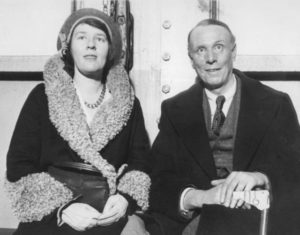
By John Vaaler
In the midst of a divorce with the Main Street author Sinclair Lewis, journalist Dorothy Thompson wrote to her future ex pleading to keep their farmhouse in Barnard, Vt. “Give me Vermont,” wrote Thompson. “I want to watch the lilac hedge grow tall and the elm trees form, and the roses on the gray wall thicken, and the yellow apples hang on the young trees, and the sumac redden on the hills, and friends come, and your two children feel at home.”
Thompson and Lewis are just some of the literary greats who have made Vermont home. Going back to the 19th century some of the most widely acclaimed American writers ended up hanging their hats here. Rudyard Kipling played snow golf at his home in Dummerston. John Irving was an avid cyclist and customer at Putney’s West Hill Shop. Wallace Stegner summered in Greensboro. Bennington was home to Shirley Jackson (best known for her masterpiece short story, “The Lottery”), and Bennington College bred a brat pack of writers that included Bret Easton Ellis and Donna Tartt.
Writers and poets came for a variety of reasons. Russian dissident Alexander Solzhenitsyn spent 20 years in exile in tiny Cavendish. Nobel-prize winning poet Louise Gluck helped to found the New England Culinary Institute in Montpelier, near where she lived. The change in seasons certainly inspired Frost, who taught at Middlebury College.
Plenty of travelers every year tour the Hollywood boulevards where movie stars live. But only in Vermont are you able to hike to, ski to, or even stay at the former places of the many great authors who lived here.
This fall and winter, get a taste of the sense of place that drew these writers here by taking a literary adventure tour.
Stay At Sinclair Lewis’ Posh Twin Farms
Literary power couple Sinclair Lewis and Dorothy Thompson met in 1927. Lewis — whose novels such as Main Street and Elmer Gantry lampooned commercialism and American society — fell in love with Thompson, a columnist and public speaker.
Lewis convinced Thompson to marry him by saying that he would move with her to a farmhouse in Vermont (shown above). “There will be apple trees and flaming lilies, and the moon over the low mountains and you and me, after dinner, sitting….on the terrace, and inside, when it becomes chilly, the fireplace and lamplight and lots of books,” Sinclair Lewis wrote to Thompson. After a honeymoon in New York City, Lewis made good on his promise and they bought Twin Farms, a 1795-era farmhouse with 350 acres of property located in Barnard.
Thompson was one of the first American journalists to be expelled from Nazi Germany due to her criticism of Adolf Hitler’s regime. Her journalism about fascism’s rise in Europe provided her husband with material for his 1931 novel It Can’t Happen Here, which tells the story of the U.S. President Buzz Windrip, an authoritarian demagogue who establishes a dictatorship in America. Following Donald Trump’s victory in the 2016 presidential election, the novel’s sales surged. Ironically, in August 2017, Jared Kushner and Ivanka Trump, then senior officials in the Trump White House, made headlines when they visited Vermont for an expensive weekend at Twin Farms, which is now a boutique hotel .
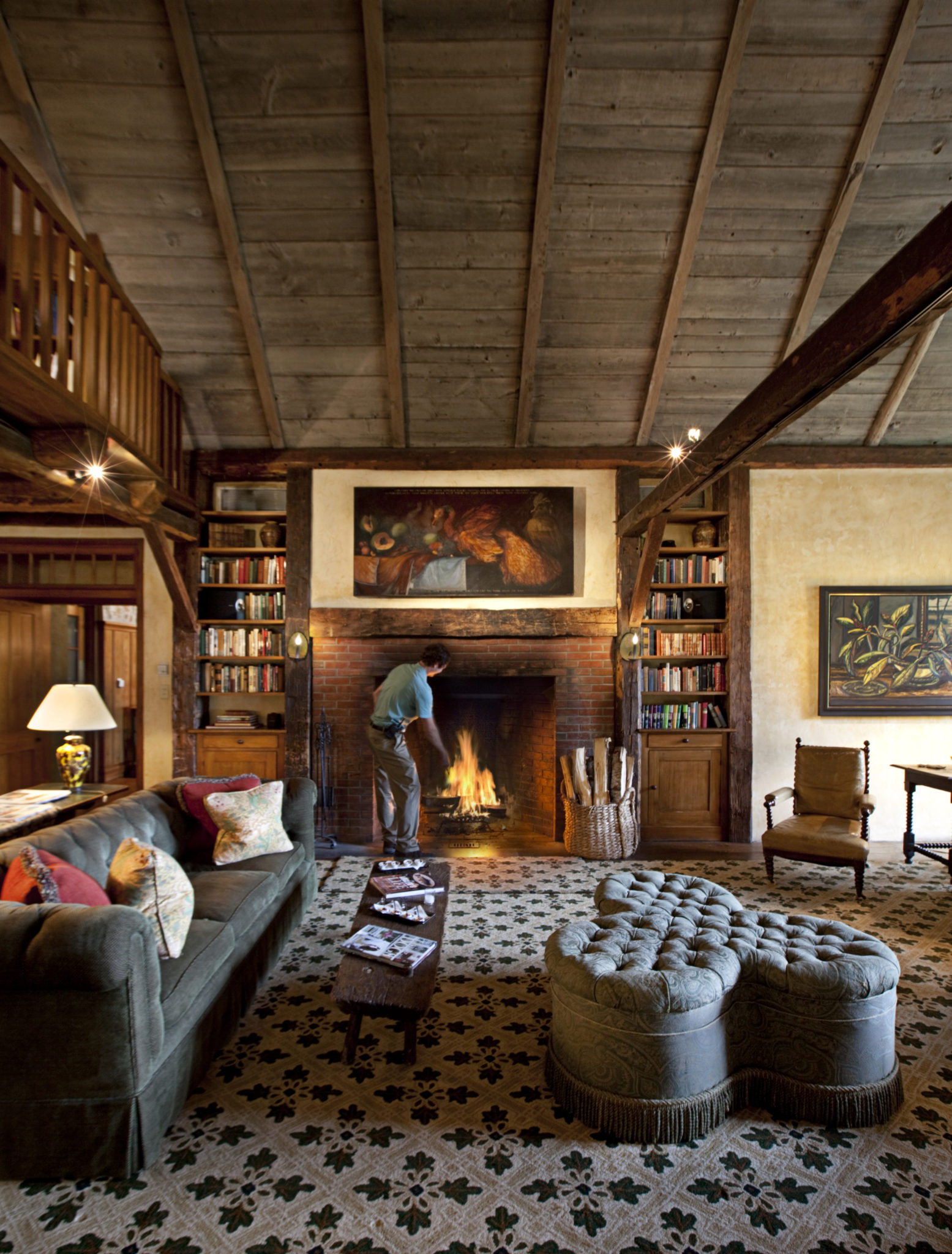 Today, Twin Farms is a luxury resort with 20 suites or cottages that offers a variety of sports including bicycling, croquet, canoeing, cross country skiing, and six downhill ski runs. A high-powered Sherpa snowmobile can transport guests back to the top after each run. A room (complete with three meals and all activities) at Twin Farms costs between $2250 and $3600 a night.
Today, Twin Farms is a luxury resort with 20 suites or cottages that offers a variety of sports including bicycling, croquet, canoeing, cross country skiing, and six downhill ski runs. A high-powered Sherpa snowmobile can transport guests back to the top after each run. A room (complete with three meals and all activities) at Twin Farms costs between $2250 and $3600 a night.
Just a mile east of Twin Farms lies Silver Lake, a few minutes drive from Lewis and Thompson’s old home. The lake is a popular spot for canoeing and paddleboarding and, in the winter, ice skating. On the northern shore of the lake is Silver Lake State Park, with 40 campsites for those who might not have Trump-sized checkbook.
On a weekday when Silver Lake is less busy, you might see what Sinclair Lewis found so charming about living in Barnard. “I like Vermont because it is quiet, because you have a population that is solid and not driven by the American mania,” Lewis said. “That mania which considers a town of four thousand as twice as good as a town of two thousand, or a city of one hundred thousand, fifty times as good as a town of two thousand. Following that reasoning, one would get the charming paradox that Chicago would be ten times better than the entire state of Vermont; but I have been in Chicago, and have not found it so.”
Hike or Ski To Robert Frost’s Cabin
For those who prefer the road less traveled, hike (or come winter, snowshoe or ski) the mile-long Robert Frost Interpretive Trail nearby off Route 125, just a few miles from the Rikert Nordic Center and the Middlebury College Snow Bowl. The trail traverses marshland on an elevated boardwalk before crossing the South Branch of the Middlebury River and Beaver Pond.
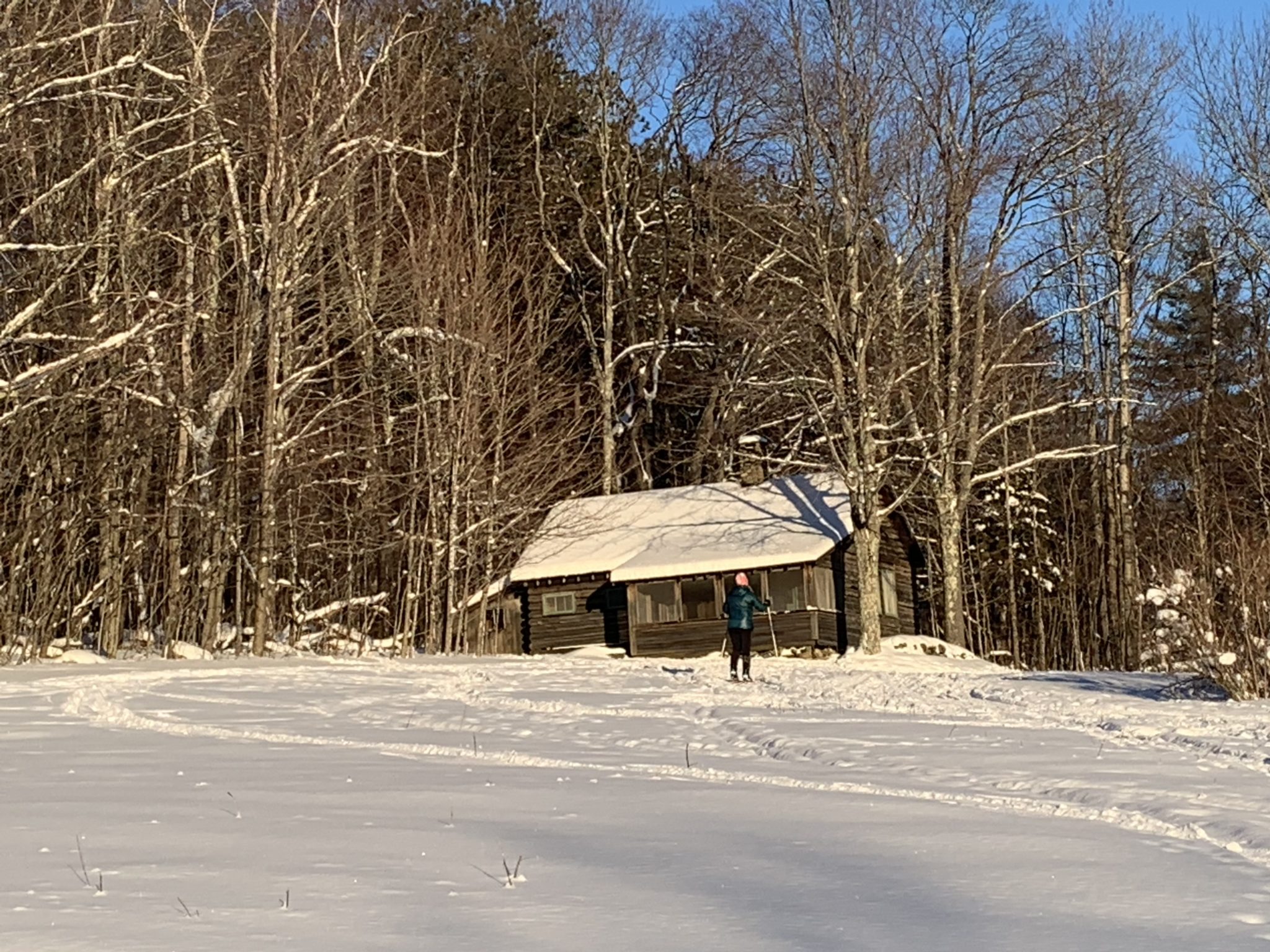 In early winter, if you meander along the trail, you might see birches as the former Vermont poet laureate described them in his poem “Birches”: “Loaded with ice on a sunny winter morning/ After a rain. They click upon themselves/ As the breeze rises, and turn many-colored / As the stir cracks and crazes their enamel.”
In early winter, if you meander along the trail, you might see birches as the former Vermont poet laureate described them in his poem “Birches”: “Loaded with ice on a sunny winter morning/ After a rain. They click upon themselves/ As the breeze rises, and turn many-colored / As the stir cracks and crazes their enamel.”
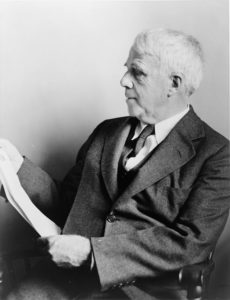 The boardwalk was recently rebuilt to be wheelchair accessible and opened in spring 2021. Around a half dozen of Frost’s poems are now posted along the trail, including one of his most famous, “The Road Not Taken.”
The boardwalk was recently rebuilt to be wheelchair accessible and opened in spring 2021. Around a half dozen of Frost’s poems are now posted along the trail, including one of his most famous, “The Road Not Taken.”
Just across Route 125 from the Frost Interpretive Trail, the road you should take is the half-mile dirt road (or in the winter, follow Rikert’s Nordic ski trails) that leads to the Robert Frost Farm and Cabin. Frost stayed at this modest cabin at Homer Noble Farm during the summer and fall months from 1939 to his death in 1963. There, he tended to the apple trees, wrote and taught at Middlebury College.
According to author and Middlebury College Professor of Creative Writing Jay Parini. “I would say Frost is the poet of the seasons. And not just four seasons, but 50 seasons. He broke the seasons down into little micro-seasons. He’s got early fall, mid-fall, late fall, depths of winter.”
During his tenure in Ripton, Frost produced A Witness Tree — the first of five poetry collections he would write while living here. It won the Pulitzer Prize for Poetry in 1943. Frost recited the book’s most famous poem, “The Gift Outright,” for President John F. Kennedy’s inauguration in 1961. It’s opening still resonates today: “The land was ours before we were the land’s./ She was our land more than a hundred years / Before we were her people.”
The simple farmhouse and the cabin are both the property of Middlebury College and off limits to visitors, but the land around them is open to skiers and hikers.
In winter, stop for a moment to listen to the “sweep of easy wind and downy flake,” or gaze east at Worth Mountain, home of the Middlebury College Snow Bowl. As Frost wrote, “The Vermont mountains stretch extended straight; New Hampshire mountains curl up in a coil.”
Play, Stay and Pick at Rudyard Kipling’s Naulakha
“There are only two places in the world where I want to live,” Rudyard Kipling wrote. “Bombay and Brattleboro.”
Born in India, Rudyard Kipling came to Brattleboro in 1892 on his honeymoon with his wife, Carrie, where they visited Carrie’s brother Beatty Balestier. The visit went so well they decided to move to Vermont. The Kiplings built their house Naulakha in nearby Dummerston. With a design inspired by Mughal architecture and other Indian influences, Kipling commented that Naulakha was meant to look like a “houseboat floating down the Connecticut River Valley.” It was here that he wrote The Jungle Book, Captain Courageous and some of his Just So stories.
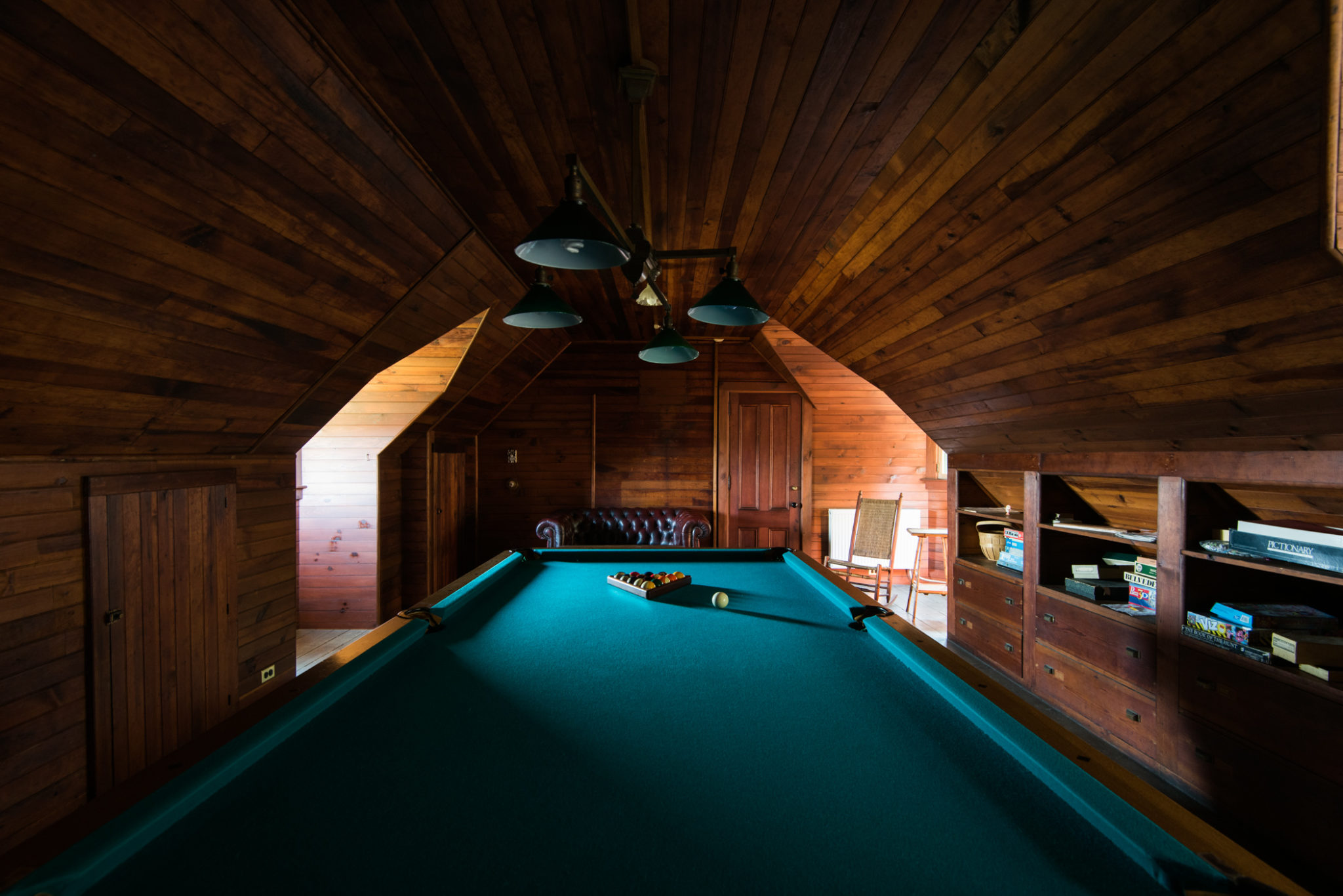 Today, you can rent out Naulakha from Landmark Trust USA for $545 a night. The four-bedroom home is still filled with much of the furniture and books that Kipling had when he lived there. The house also has a pool table and an expansive kitchen.
Today, you can rent out Naulakha from Landmark Trust USA for $545 a night. The four-bedroom home is still filled with much of the furniture and books that Kipling had when he lived there. The house also has a pool table and an expansive kitchen.
During his time at Naulakha, Kipling tried out several sports — and not always in season. Some believe that Kipling was one of the first participants of the sport “snow golf.” The story goes that Kipling picked up the sport after Sherlock Holmes author Sir Arthur Conan Doyle visited the estate and showed Kipling his golf clubs. “Even years later, (the house’s residents) were finding painted balls that Kipling would shoot,” Landmark Trust USA Executive Director Susan McMahon said. A tennis court on Naulakha’s grounds (still in use today) may be another seminal addition to Vermont sports. “They say it’s the first tennis clay tennis court (in Vermont),” says McMahon.
Kipling left the state following an argument in 1896 with his brother-in-law Balestier.
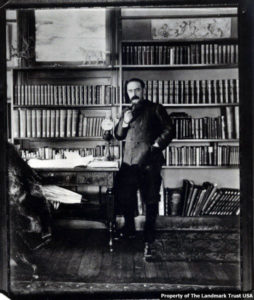 If you can’t rent the house (and play snow golf or tennis there), you can enjoy something else that has been around since Kipling’s day: Go apple picking at Scott Farm, also part of the Landmark Trust property. The orchards, located one mile away from Naulakha, have been cultivated since the late 1800s. More than 120 varieties of apples grow there now, including the juicy, rich Hudson Golden Gem, the crisp Cox Orange Pippin and the Esopus Spitzenberg, which Thomas Jefferson considered “unsurpassed as a dessert fruit.” The farm also specializes in preserving heirloom varieties.
If you can’t rent the house (and play snow golf or tennis there), you can enjoy something else that has been around since Kipling’s day: Go apple picking at Scott Farm, also part of the Landmark Trust property. The orchards, located one mile away from Naulakha, have been cultivated since the late 1800s. More than 120 varieties of apples grow there now, including the juicy, rich Hudson Golden Gem, the crisp Cox Orange Pippin and the Esopus Spitzenberg, which Thomas Jefferson considered “unsurpassed as a dessert fruit.” The farm also specializes in preserving heirloom varieties.
In fall, it’s “pick your own” and the farm’s market is open seven days a week until Thanksgiving. Other activities hosted by Scott Farm in the fall include the Heirloom Apple Days Celebration on Oct. 10, a Crêpe Night on the second Wednesday of each month, and classes throughout the autumn on apple-pie making, gluten-free cooking and cider brewing.
Aside from Kipling, Scott Farm has another literary connection: The farm was a shooting site for the film :The Cider House Rules”, an adaptation of the John Irving novel.
Hike or Ski over Wallace Stegner’s Greensboro
Wallace Stegner’s novels are more often associated with the American West than Vermont. But for more than 50 years, the Pulitzer-prize winning novelist and his wife packed up their station wagon and drove from their California Bay Area home to spend their summers in Greensboro, in Vermont’s Northeast Kingdom. Stegner was so embedded with the Greensboro community that he was asked to write the forward to the town’s official history.
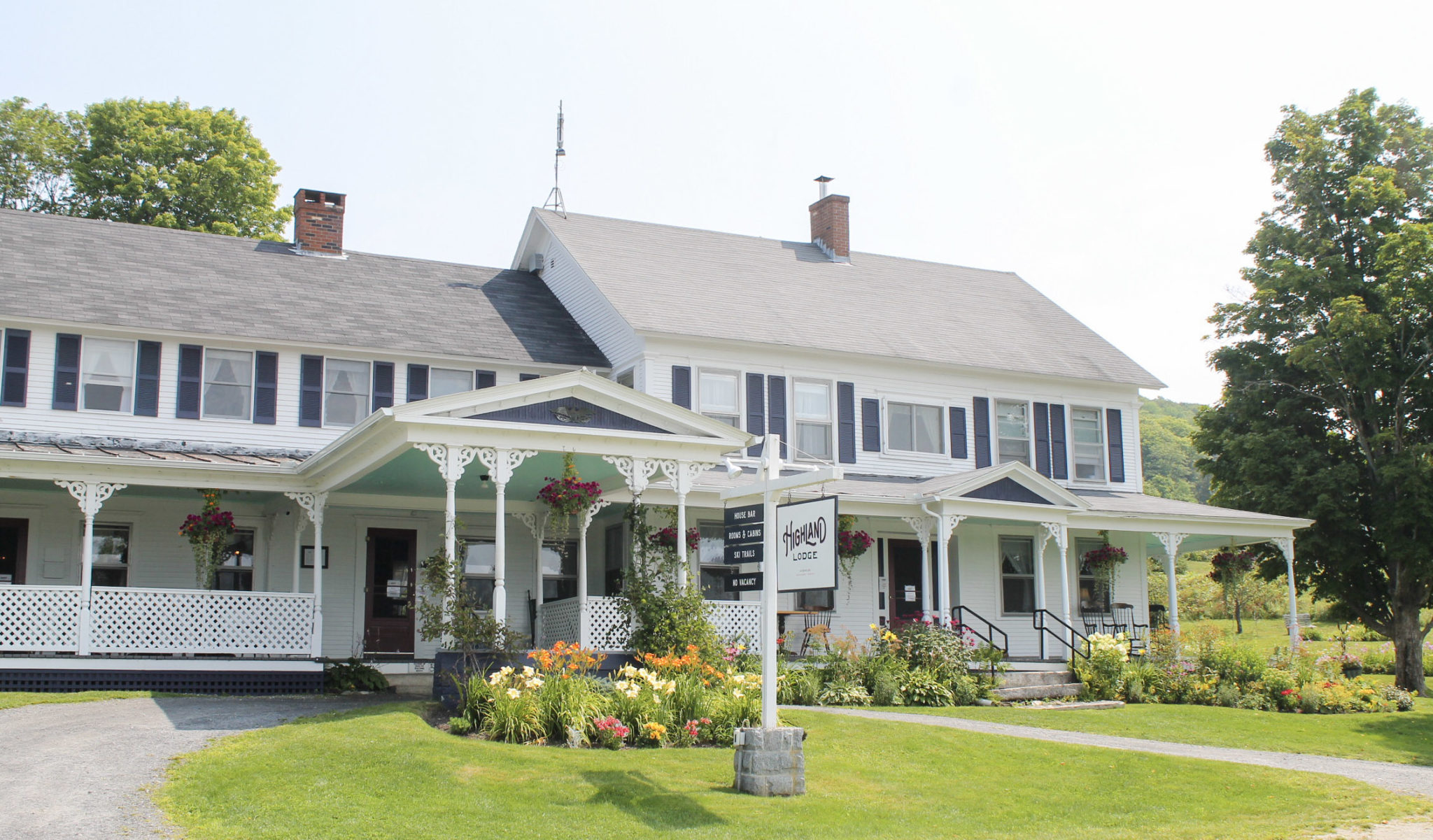 In it, he wrote: “From the first day I saw it, I responded to Greensboro because it had what I lacked and wanted: permanence, tranquility, traditional and customary acceptances, a stable and neighborly social order.” In Greensboro, Stegner also wrote parts of his novel Angle of Repose.
In it, he wrote: “From the first day I saw it, I responded to Greensboro because it had what I lacked and wanted: permanence, tranquility, traditional and customary acceptances, a stable and neighborly social order.” In Greensboro, Stegner also wrote parts of his novel Angle of Repose.
Greensboro, where his novel Crossing to Safety is set, is home to Highland Lodge, which was established in the 1920s. Since its founding, the resort has been especially popular as a summer stay for the families of Ivy League professors. At the Lodge, you can ski out the door on the 105 kilometers of groomed cross-country ski and bike trails maintained by the Craftsbury Outdoor Center and Greensboro Trails Association.
Reserve Highland Lodge’s Wallace Cabin (named after Wallace Stegner), stroll to the beach on Caspian Lake or weave through the meadows and hills Stegner once traversed on the Barr Hill Nature Reserve Trail just east of the lodge. The trail is a .8 mile walk through pines, red maple and yellow birch. Barr Hill rises 2,100 feet, and from its summit, you can see Jay Peak to the north, and even Mount Washington in New Hampshire.
In Crossing to Safety, Stegner writes of a fictional “Folsom Hill” — no doubt modeled on Barr Hill: “I wonder if I have ever felt more alive, more competent in my mind and more at ease with myself and my world than I feel for a few minutes on the shoulder of that known hill while I watch the sun climb powerfully and confidently and see below me the unchanged village, the lake like a pool of mercury, the varying greens of hayfields and meadows and sugarbush and black spruce woods, all of it lifting and warming as the stretched shadows shorten. There it was, there it is, the place where during the best time of our lives friendship had its home and happiness its headquarters.” n

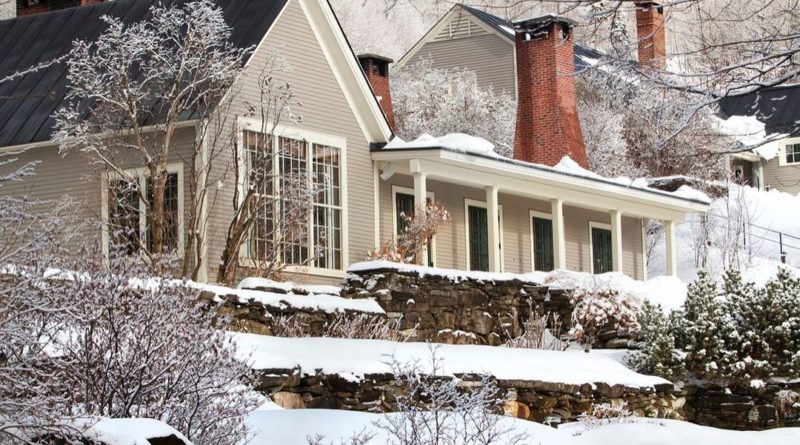
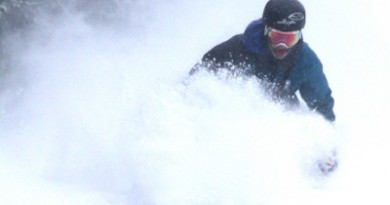
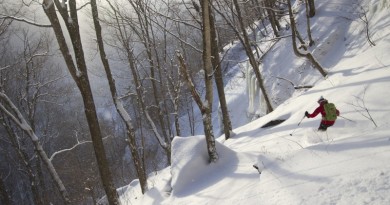
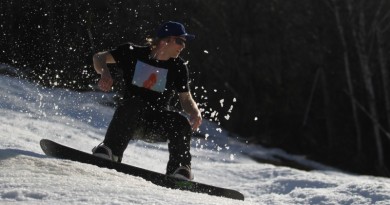
Pingback: VT Ski + Ride 2021 Fall Season Preview Issue – VT SKI + RIDE